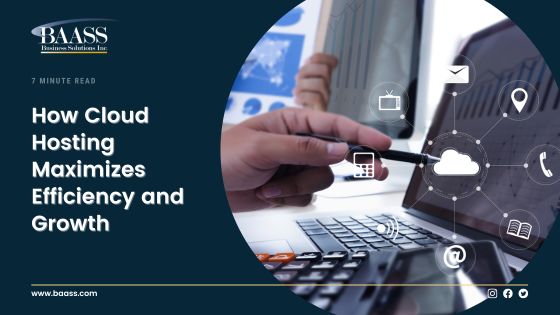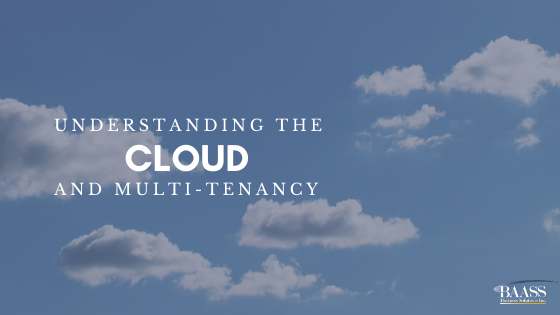In today's fast-paced business environment, organizations are constantly trying to maximize efficiency and drive growth. One technology that has gained immense popularity is cloud hosting. In this blog post, we will explore how cloud hosting can optimize your business operations, leading to improved efficiency and accelerated growth.
Read More >How Cloud Hosting Maximizes Efficiency and Growth
Understanding The Cloud and Multi-tenancy
How Cloud Computing Can Help You
Small to mid-sized manufacturers often face an uphill battle to compete against larger manufacturers. Often, they focus on a specific niche, industry, or customer base to capitalize on opportunities that larger manufacturers won’t or can’t touch. But sometimes, even that isn’t enough to give them the edge they need to compete against the “big boys” in their field.
Read More >Why everything you think you know about Cloud Security is wrong - Part II
Continuing my previous blog regarding cloud security myths we start with the next myth on the list:
Myth: Cloud Security is a New Challenge
The truth is cloud security isn’t new, it’s not even unique. “Security concerns are really independent of the cloud”. They’re just an extension of what's being dealt with in the physical infrastructure.
Is the Cloud right for you - Part 1
If we define the cloud in its simplest terms as access to files/data/programs via the Internet what are the criteria most organizations and individuals use to determine if the cloud is right for you or your business.
1) Capital Expenditures - The cloud pricing model is a subscription based pay as your go model which defers the large upfront initial payments, associated with traditional on premise models, over time.
2) Disaster recovery - Most cloud providers use Tier 1 or Tier 2 data centers to provide their software as service. The disaster recovery protection they typically provide is not comparable to what a typical organization could manage with its own hardware, network infrastructure. Even if they could the costs would likely be prohibitive.
3) Scalability - Again the data centers above are built with so much capacity there are rarely issues with the growth of your system. As your business or organization grows you are able to add users, functionality, or storage with ease. In the on premise environment we often run into capacity issues due to size of or some other restriction of our hardware or network. Again the comparable cost of the type of capacity a cloud service provider can deliver in the on premise world is likely more than the average business can manage.
4) Version upgrades - It is has become a huge concern of the on premise software industry. It is often quite costly to upgrade from one version to another. In the cloud upgrades are often occurring with complete transparency to the customer both in terms of technology and cost.
5) Hardware life cycle - In the on premise world your hardware has a life expectancy. In the cloud your cloud provider is responsible for your hardware. occasionally hardware will need to be upgraded and this may take your systems down but it does not change your predictable subscription pricing. You are provided with plenty of notice and the systems are down for a predictable amount of time with little impact to your business. The experience is much different than the hardware failure and hardware upgrade horror stories we often hear about in the on premise world.
6) Accessibility mobility - As cloud systems are available over the Internet there is rarely a place you can not access your data and there is rarely a device with which you can not access your data. On premise models often rely on remote communications software which have restrictions in terms of where or with what device you can access them. In the cloud as as long as you have a browser and Internet access you can typically connect.
The above would be criteria that typically favor a cloud scenario in my next article I will speak to some of the criteria that may favor a on premise scenario. Please stay tuned and feel free to comment on other criteria that you feel favor a cloud type implementation.
Benefits of Cloud Computing
Cloud computing is a way of distributing software completely over the Internet, relieving you from the burden of IT expenditure and maintenance. In contrast to on-premises software, cloud computing presents a host of benefits including:
- Anywhere, anytime accessibility to real-time information about your business so your entire staff can make knowledgeable choices, no matter where they are located.
- Reduced TCO eliminating capital expenses, operating expenses and hardware and software installation and maintenance - freeing your IT staff to concentrate on more strategic projects.
- Operational Distinction, including back up, disaster recovery and a 99.8% uptime guarantee - better than what most small and mid-sized businesses can guarantee internally.
- Pre-built integrations that remove the burden and expenditure of connecting complex software products with one another.
Contact BAASS to discuss our Cloud options for Accounting and CRM.
Considering a Transition to Cloud Computing?
Subscribe Here!
POSTS BY SOLUTION
- CRM (54)
- ERP (54)
- BI (43)
- Tips & Tricks (37)
- Cloud (33)
- Baass Connect (26)
- HRIS (26)
- Payroll (16)
- Error Message (15)
- Manufacturing (13)
- WMS (13)
- Business Intelligence (12)
- Sage CRM (11)
- Sage 300 ERP (10)
- Sage Tips (10)
- Cloud ERP (9)
- BAASS News (8)
- Baass Business Solutions (8)
- Inventory (8)
- Sage 300 (8)
- Cloud Computing (7)
- Intacct (7)
- Sage ERP (7)
- Sage Intacct (6)
- Service Management (6)
- Development (5)
- Fixed assets (5)
- Security (5)
- Work From Home (5)
- data management (5)
- inventory management (5)
- remote working (5)
- AI (4)
- Supply Chain Software (4)
- business forecasting (4)
- cloud solution (4)
- project management (4)
- Cloud Security (3)
- Customer Relationship Management (3)
- ERP system (3)
- Forecasting (3)
- Sage Payroll (3)
- cloud based solution (3)
- financial data (3)
- AP Automation (2)
- Accounting Software (2)
- Automation software (2)
- BI Tools (2)
- Budgeting (2)
- Business General (2)
- CRM system (2)
- Canada Economy (2)
- Canadian Payroll (2)
- Cloud Accounting (2)
- Cloud Financial Management (2)
- Cloud Hosting (2)
- Compliance & Risk Management (2)
- Crystal Reporting (2)
- Digital Transformation (2)
- Excel (2)
- Finanacial Year Closing (2)
- Fixed Fee Pricing (2)
- Legislation (2)
- Mining (2)
- Productivity (2)
- Reporting (2)
- Sage FAS (2)
- Sage HRMS (2)
- Sage HRMS Payroll (2)
- Sage X3 (2)
- Senior Living (2)
- Success Story (2)
- tips (2)
- womenintech (2)
- AR Automation (1)
- Accounts Payable (1)
- Accpac (1)
- Avalara (1)
- BAASS Trace (1)
- BI Software (1)
- Barcoding (1)
- Benefits of Cloud Computing (1)
- Best Practices (1)
- CRA (1)
- Canada Pension Plan (1)
- Canadian Business (1)
- Canadian Dental Care Pension Plan (1)
- Cloud Services (1)
- Cloud Software (1)
- Construction (1)
- Credit Card Payments (1)
- Credit Card Processing (1)
- Distribution (1)
- Document Management (1)
- EDI (1)
- ERP Cloud (1)
- ERP Consultant (1)
- ERP Software Failure (1)
- ERP solution (1)
- Economic (1)
- Evaluate Accounting Software (1)
- Evaluate your software (1)
- Evaluating Accounting Software (1)
- FAS (1)
- Financial Management (1)
- Financial Solutions (1)
- Food and Beverage (1)
- Function of Warehouse Management Systems (1)
- Global Business (1)
- Inventory Control (1)
- Multi Entity (1)
- NFP (1)
- Nonprofits (1)
- Operational and Financial Information Systems (1)
- Order constraints (1)
- Outgrown QuickBooks (1)
- PST in BC (1)
- Plus Computer Solutions (1)
- RRSP (1)
- Sage (1)
- Sage 300 Payroll (1)
- Sage BI (1)
- Sage Business Partner (1)
- Sage Enterprise Intelligence (1)
- Sage Intelligence (1)
- Sage Inventory Advisor (1)
- Sage Software (1)
- Senior Living Facility (1)
- T4 (1)
- T4/T4A Boxes (1)
- Tailored Solutions (1)
- The Cloud (1)
- Year End Close (1)
- Year end Payroll Checklist (1)
- accounting management software (1)
- accounting software system (1)
- conference (1)
- data (1)
- data backup (1)
- efficiency (1)
- employee self service (1)
- myths (1)
- planning (1)
- solution (1)
- staff scheduling (1)
- technology (1)
- training (1)


